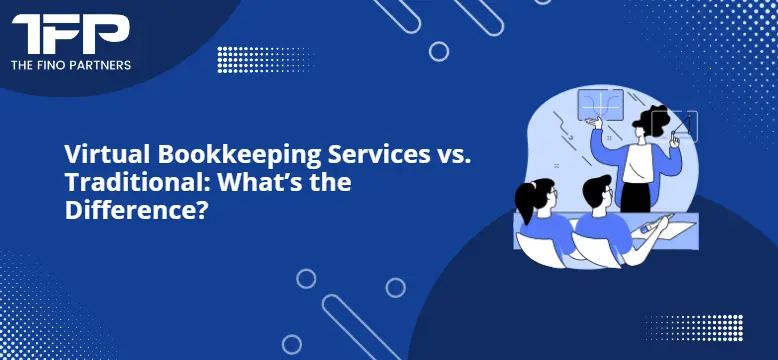Today's world of the fast-moving digital landscape compels businesses to become more efficient towards their financial solutions. There are some significant changes brought by this era into a specific domain like bookkeeping, as one such modern option of bookkeeping has become a virtual option, challenging the conventional forms of bookkeeping. Which of the two forms works out and why is the debate going on within the boundaries of small and startup organizations, not only for them but for giant firms also? Here in this guide, we'll delve deeper into what virtual bookkeeping is, how it works in comparison to the classic methods, and why companies in the United States make the switch.
Why go for Virtual Bookkeeping?
- Online Access: Run the show from anywhere with virtual bookkeeping services.
- Affordable: No overheads involved by bringing in-house bookkeeping within the company.
- Elastic and Efficient: Up-surge and down-surge in company need.
What are Virtual Bookkeeping Services?
Virtual bookkeeping allows companies to maintain the books through technology from a distance without necessarily having an on-site bookkeeper. Since a virtual bookkeeper would work remotely, they're often part of a team operating off-site to manage your records, reconcile accounts, and generate financial reports.
How Does Virtual Bookkeeping Services Work?
- Online Communications: Communication occurs through emails, calls, or video conferencing.
- Cloud-Based Software: Access through secured software like QuickBooks or Xero.
- Secure Document Sharing: Share documents through encrypted platforms.
- Real-Time Updates: Get updated on finances without waiting for office hours.
Advantages of Virtual Bookkeeping Services for Small Businesses
Read Also:- The Benefits of Virtual Bookkeeping Services for U.S. Small Businesses
- Time-Saving: Free up time to focus on growth.
- Cost Reduction: Cut down on expenses by only paying for the services you need.
- Data Security: Protect sensitive information with secure software.
Traditional Bookkeeping Explained
Traditional bookkeeping occurs when you have a bookkeeper stationed in your business to physically record financial accounts either on paper or through simple bookkeeping software. This has been the case for many years and is still common today. It is best suited for businesses that need face-to-face interaction.
How Traditional Bookkeeping Works
- On-site Bookkeeper: You can hire a bookkeeper or outsource one to sit in your office.
- In-Person Meetings: Meet with the bookkeeper in real time to discuss financial details.
- Manual Inputting of Data: It is typing where mistakes are more likely.
- Short Working Hours: Updates can only be done within business regular time
Disadvantages of Traditional Bookkeeping in SMEs
- Costlier: Traditional bookkeeping is relatively pricier as it absorbs overhead costs.
- No Flexibility: Updates are only based on the availability of the bookkeeper.
- Physical Documents: Being a paper-based document, it easily gets misplaced or destroyed
Virtual bookkeeping vs. Traditional bookkeeping
Here is a head-to-head comparison to outline the key differences between virtual bookkeeping services and traditional bookkeeping approaches.
Virtual Bookkeeping vs. Traditional Bookkeeping
Cost
- Virtual Bookkeeping: Usually cheaper due to lower overheads.
- Traditional Bookkeeping: Expensive, primarily because of office space, utilities, and much more.
Flexibility
- Virtual Bookkeeping: Available anywhere, anytime.
- Traditional Bookkeeping: Only possible during standard business hours.
Efficiency
- Virtual Bookkeeping:Automates many processes, less likely to make manual errors.
- Traditional Bookkeeping: Usually depends on manual entry and prone to human errors.
Data Security
- Virtual Bookkeeping:Cloud-based, secure software.
- Traditional Bookkeeping: Risks with physical documentation and manual systems.
Collaboration
- Virtual Bookkeeping: Easy collaboration with cloud software.
- Traditional Bookkeeping: Depends on in-person availability.
Why Virtual Bookkeeping Services Are Ideal for Small Businesses
Virtual bookkeeping services are the clear winner when it comes to flexibility, cost, and scalability for small businesses. Let's look at some of the reasons why most small business owners in the U.S. prefer virtual over traditional.
Cost-Effectiveness
Virtual bookkeeping saves small businesses money to rent a space, utilities, and employee benefits among other in-house benefits for the employees.
Access and Convenience
One can access the books and financial records virtually anytime. Business owners usually don their various hats and being able to work on them any place, and at any given time is quite useful for such individuals.
Increased Data Security
Online virtual bookkeepers have safer online software with minimal likelihood of losing or hacking your data since such would not be possible in case it were in hard copies.
How to Select the Best Virtual Bookkeeping Services
There are aspects that should be considered when selecting the best virtual bookkeeping services. Here is a guide on how to make the best selection.
Evaluate Your Business Needs
Know the specific services your business needs. Are you in need of periodic bookkeeping, payroll, or tax preparation? You will be able to look for a virtual bookkeeper who provides the right service.
Check Their Expertise
Find a provider that specializes in your industry. Companies from the U.S. hold experience with local professionals well up to date with all local regulations and tax requirements.
Software Compatibility
Choose a virtual bookkeeping service that uses compatible software on your system, be it QuickBooks or Xero.
Conclusion
In determining whether to engage in virtual bookkeeping or the traditional process, the nature of a business will help decide this. Virtual bookkeeping offers flexibility, and savings, and is more secure as compared to the traditional type, thus making it more attractive for most small businesses in the United States. Traditional bookkeeping serves its purpose to have one-on-one time with one's bookkeeper, yet, how convenient and time-saving these new virtual solutions are.
Fino Partners offers the most efficient professional virtual bookkeeping services so that you can adapt your business with an understanding of real-time bookkeeping requirements to grow the business hassle-free, without having it managed in-house.




























